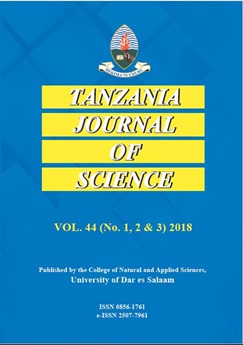Phytochemical Investigation, Anti-inflammatory and Analgesic Activities of Ethyl Acetate Extract of Pride of Barbados Pod (Caesalpinia pulcherrima)
DOI:
https://doi.org/10.4314/tjs.v48i3.3Abstract
Pride of Barbados is a therapeutic herb which has wide traditional applications in the treatments and management of diverse ailments. Diseases pose great threats to human race. This research was aimed at evaluating the phytochemicals, proximate composition, acute toxicity, anti-inflammatory, and analgesic activities of the pod extract of Pride of Barbados in order to provide a scientific validation for its use as a therapeutic herb. All analyses were carried out using already established methods; the antioxidant potential was examined using 1,1-diphenyl-2-picrylhydrazyl (DPPH) radical scavenging assay, while the formalin-induced inflammation and acetic acid-induced writhing techniques were used to evaluate the anti-inflammatory and analgesic activities, respectively. Phytochemicals detected were alkaloids, tannins, saponins, flavonoids and phenolic compounds. The moisture content, crude fibre, acid insoluble ash, water soluble ash and total ash were 9.02 ± 0.02%, 9.04 ± 0.01%, 2.78 ± 0.02%, 1.20 ± 0.00% and 4.35 ± 0.13%, respectively. The IC50 values for the DPPH radical scavenging capacity of the pod extract and ascorbic acid (standard) were 50.05 ± 0.50 and 5.20 ± 0.85 µg/mL, respectively. The oral administration of crude ethyl acetate pod extract of Pride of Barbados to Swiss mice was not toxic even up to a dose of 5,000 mg/kg. The pod extract showed a significant decrease (p < 0.05) in the formation of formalin-induced oedema and the number of writhes in the acetic acid-induced writhing test in a concentration (dose) dependent manner. This study confirms the phytomedicinal use of the pod extract of Pride of Barbados with rich pharmacological and antioxidant properties.
Keywords: Pride of Barbados; Caesalpinia pulcherrima; Anti-inflammatory; Analgesic; Phytochemicals.


